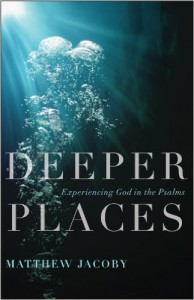Review: Deeper Places
Gill and I are long time fans of the Australian Christian musical phenomenon that is Sons of Korah. Headed by Matthew Jacoby, the Sons of Korah project is to set the Old Testament psalms to music. Their philosophy is one of interpretation rather than re-interpretation; they provide a literal musical “translation” more than a paraphrase. The lyrics are often word-for-word of an English text. The composition makes heavy use of strings and multi-layered folk melodies to communicate not just the meaning, but the feeling, of the psalms. They are both affective and effective.
It was a great delight, therefore, to have Matthew Jacoby’s book Deeper Places thrust into my hands by Gill after she had eagerly devoured it herself.
Here Jacoby lays out not just his philosophy for approaching the psalms, but the philosophical imprints of the spirituality that he has learned from them. It is the essence of his doctoral studies and so this is no touchy-feely pop-psych pseudo-tract; it is a deeply applicable theological treatise. It has fed my soul, expanded my mind, deepened my homiletics, because it has drawn me to the Word of God and the words of God’s people.
For Jacoby the psalms express an holistic spiritual journey. The ultimate end is to instil “rightly oriented desire” (p68) in the hearers/readers/singers. It is no accident that the “chief end of man” is quoted towards the end of the book as he explores themes of enjoyment and praise.
At the highest point of the spiritual journey portrayed by the Psalter, we find people enjoying God. In their enjoyment of God, they become vessels of praise to God. This deeper sense of praise is precisely what is meant to “glorify.” We can praise God in a shallower sense with words alone, but we can only glorify God by enjoying him. (p161)
But, as they say, it’s the journey that counts. The psalms are not just about praise and glory, they are also full of query, doubt, tension, and raw lament. It is in the consideration of these aspects that Jacoby’s commentary is of the greatest value.
Jacoby locates the beginning of the praise-bound journey not in victory but in the raw brokenness of this world.
From our perspectives, they [the psalms] express the desire to feel loved, to be affirmed and validated, to feel secure, and so forth. This earthly spirituality, as I have called it, is also seen in the psalms in the ample expression they give to the complications of our human dysfunction. Human dysfunction does not guide these expressions, but our dysfunction does cause a constant tension in our relationship with God that must be brought to the surface with honest communication, as it must be in any relationship. This is what we see in the psalms. (p26)
In his definitive metaphor God is imaged as an ocean in which we are suspended. The human dysfunction is a shell that not only insulates us from the divine, but propels us upwards to the shallows like a bobbing submarine. In contrast, the journey of the psalms is ever deeper, and necessarily a journey of tension; the lament of human hurt mixes with the life-filled promises of God until the shell bursts and we are consumed inwardly and outwardly by God’s presence, which we therefore glorify.
“…the psalmists deliberately bring two things into tension. They deliberately highlight the reality of their situation as it stands in tension with the reality of God and his promises. As both realities are amplified, this very tension then becomes the seedbed for faith and hope. Faith is conceived by the injection of the divine promise into the open wound of a heart that has allowed itself to be wounded by reality.” (p86)
I have long rejected the association of “spiritual” with “ethereal.” To be spiritual is to go deep, into gut-level issues. And spiritual work is work that (often painfully) adjusts our foundations, or is so rooted upon our foundations that the depths of our soul is welled up and out. Jacoby threads this notion through the Psalter, revealing it’s nature not just as a song-book but as an exercise-book for life.
Like his songs, Jacoby has taken what already exists and has brought it to life in lively language that I for one will be referencing again and again. He has done the preacher’s task in an extraordinary way. In the very best sense he has opened the Word of God.



